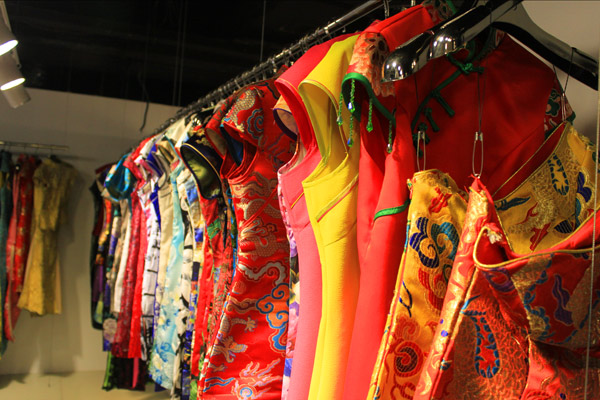|
|
|
Cheongsam feature colorful and delicate embroidery. Photo by Lyu Shuang/China Daily |
The New Photo Studio, which is located in Tianjin's downtown, attracts many young people who want to take wedding photos and fashion photo albums every day. However, on Saturday afternoon, a few old ladies walk into the studio.
With fine makeup, paper umbrellas and vintage high heels, they start practicing different gestures like hands on hips, looking down, turning around. Liu Jingchun, one of the ladies, has just celebrated her 70th birthday. Dressed in a white cheongsam, she strikes various elegant poses under the photographer's guidance.
The collective shooting was not quite a personal fashion album. They are participating in a special project called "Guohua-Global Chinese Cheongsam Image Giant Scroll".
Cheongsam, or qipao, the body-hugging one-piece dress, was often considered the quintessential national dress for Chinese women and popularized in the 1920s by daring activists, fashionable socialites and celebrities. After the founding of New China, it gradually faded away especially as modernization was battered in the period of the "cultural revolution" (1966-76).
Some worry the cheongsam will die out, but 50-year-old Liu Bing, a local TV host who co-owns the studio and initiated the project, is eager to promote Chinese cheongsam culture visually.
His interest in the cheongsam was inspired by the old photos of women wearing cheongsam which his grandfather, a former newspaper chief editor took.
He learned more old stories about cheongsam while working at the local TV station.
"Its history has witnessed Chinese women's self-liberation. Although ‘she' gradually faded away from our daily life, it does not mean ‘she' already lost her attractiveness to us." Liu says of the iconic women in this traditional garb.
"I want to provide a place for these fans, and to use my camera to record their beautiful moments."
Liu's team invited people to join in the photography project, each paying 260 yuan ($42). He says more than 1,000 people will come and dress in cheongsam in the next few months, and the captured images will be presented on a giant scroll like the Chinese painting Qingming Shanghe Tu (The Scene at the Upper River during Qingming Festival).
So far he has collected more than 500 people's photos, of all races and nationalities and almost 750 people, including celebrities, famous hosts and pop stars, have reserved time slots on the shooting schedule. The age of participants ranges from 4 to over 80.
Cheongsam used to be very luxurious, beautifully cut, and made of colorful silk cloth, exquisite embroidery with traditional Chinese patterns, like phoenix and peonies, Liu says.
Zhang Jinglin, 57, one of the older ladies who came in the group on Saturday, says she owns more than 30 pieces of cheongsam, which are customized for different seasons and occasions.
"I felt she was so amazing, when I saw my mother in cheongsam," says Zhang, who poses for the project in a long pink dress. "The white silk accurately carved out her figure to perfection. The orchid embroidery, embracing her waist, looked like a man's slender fingers tapping his lover."
Wang Deyue, 63, who also came for a photo shoot, says a fleeting memory of her mother makes the project significant for her. "My mother died so young, the only image I could remember about her was condensed into a photo in which she wore a brunette kind of cheongsam."
"Now more people want to own customized cheongsams," says Liu, with surprise at the response to the project, "and we have received many invitations from overseas Chinese who hope that such activities could be held in other parts of the world."
Liu also cooperates with Fang Zi, a local fashion designer, in designing a Hanfu collection to revitalize the traditional Chinese dress invented during the Han Dynasty (202 BC 220 AD).
Fang, with 15 years of cheongsam-design experience, is famous for her unique sewing skills and exquisite works. In this project, she is in charge of designing various types of cheongsam.
Now, young women account for about 40 percent of all the participants. Most of them come to take photos with their mothers and grandmothers.
Liu divides his project into several stages. He plans to curate an exhibition of the 1,000 cheongsam photos to celebrate the 65th anniversary of the founding of New China on National Day on Oct 1.
"But it's not the end," he says.
"The vintage memories are just beginning."
